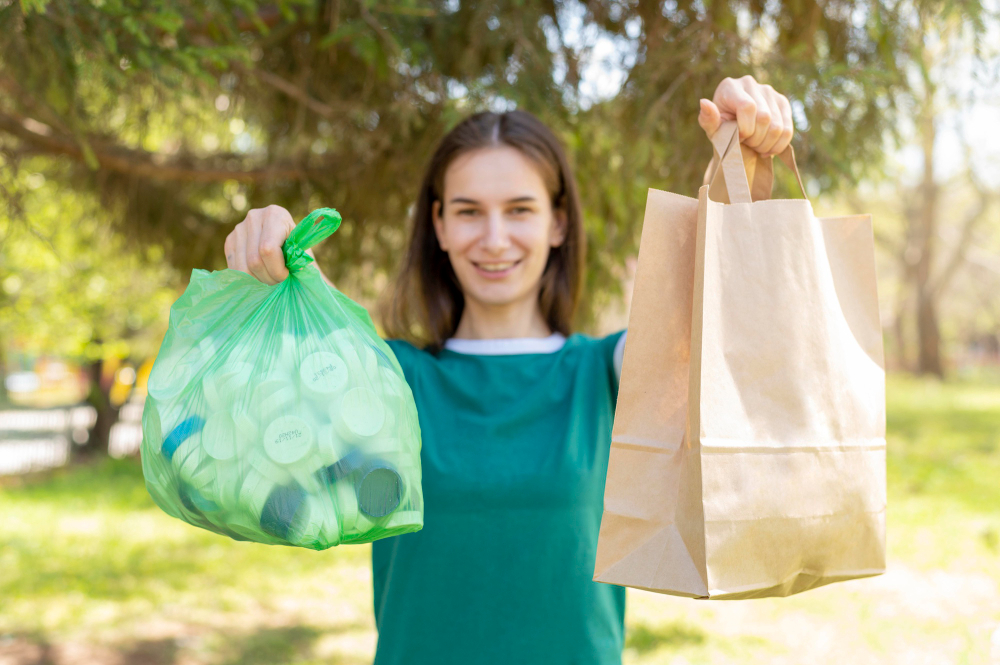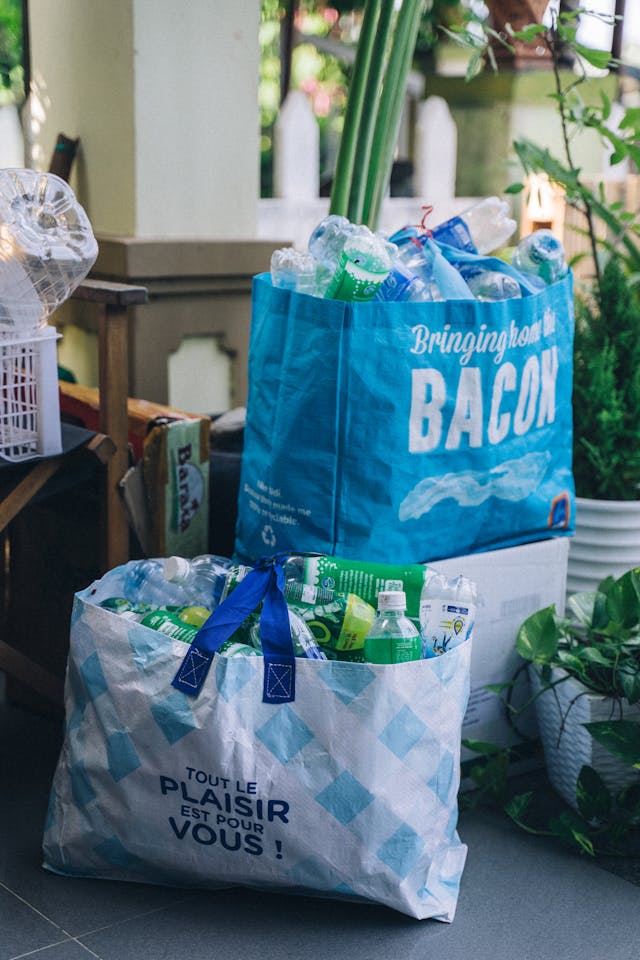The use of compostable trash bags for waste management seems to be a growing trend around the world today. A good number of top-tier companies (private and public) have adopted the use of these bags because not only are they eco-friendly, but they have significant environmental benefits. The awareness revolving around the use of compostable materials, in general, is spreading so rapidly that even you might have disposed of dirt in a compostable trash bag in your office or a public waste can without knowing.
This shift towards sustainable products is simply a reflection of a broader commitment to better waste management. However, it is not enough just to want to use compostable bags; you also need to know how to use and dispose of them correctly. You can only take full advantage of the environmental benefits of these bags when you understand the specific conditions under which these bags decompose and how to integrate them effectively into your daily routines.

Understanding Compostable Trash Bags
Compostable trash bags are a key player in our ongoing battle against plastic pollution. But what exactly does “compostable” mean? Simply put, these are bags designed to break down into natural elements within a compost environment, leaving no toxicity in the soil. They are typically made from materials like polylactic acid (PLA), as well as renewable resources such as corn starch and other plant-based products. This is a stark contrast to traditional plastic bags, which are made from petroleum products and can take hundreds of years to degrade, if at all.
The terms “compostable” and “biodegradable” might seem interchangeable, but there’s a notable difference. While all compostable materials are biodegradable, not all biodegradable materials are compostable. Biodegradable products break down naturally over time, but they may leave behind metal residues and other pollutants, whereas compostable products break down into nutrient-rich compost that benefits the soil.
When it comes to the journey of a compostable trash bag, from the get-go, these bags are crafted with the environment in mind. Made from plants, they consume less energy during production and, unlike conventional plastic bags, can return to the earth and enhance soil health once they decompose. You can now see that the goal is not solely to get rid of trash responsibly but also to give back to the earth and promote a healthy environment.
Read More: How Food Waste is Degrading the Environment
Proper Use of Compostable Trash Bags
When making the switch to compostable trash bags, it’s essential to choose the right kind to match your needs and ensure they perform effectively. Here’s how to select and use them correctly:
Choosing the Right Bags

Selecting the Appropriate Bag for Different Types of Waste: Compostable bags come in various strengths and sizes. For kitchen waste, which often includes food scraps, a thicker bag might be necessary to handle the moisture and weight. For lighter, dry waste like leaves or grass, thinner and possibly larger bags could be more appropriate.
Certifications and Labels: To avoid the pitfalls of greenwashing, look for specific certifications that ensure the bags meet stringent compostability standards. Certifications such as BPI (Biodegradable Products Institute) or EN13432 in Europe indicate that the bags can break down effectively in the right composting conditions. These labels also ensure that the bags do not leave harmful residues in the compost.
Matching Bags to Composting Methods: Not all compostable bags are suitable for home composting environments, which generally have lower temperatures than industrial composting facilities. Check the packaging for indications of whether the bags are suited for home or industrial composting setups. Using the wrong type can mean the bag won’t fully decompose.
Daily Usage Tips
Effective Waste Management: Use compostable trash bags primarily for organic waste, as these bags are meant to break down in a composting environment. Avoid placing recyclables or non-organic trash in these bags, as they could contaminate the compost with non-degradable items.
Types of Waste for Compostable Bags: Ideal contents for compostable bags include food scraps, yard waste, and other biodegradable materials. Avoid putting in plastics, glass, metals, or chemicals, which can hinder the composting process and potentially damage the quality of the resulting compost.
Storing and Handling Tips: Store your compostable bags in a cool, dry place to prevent them from starting to break down. High humidity or heat can compromise the integrity of the bags, making them tear easily and become difficult to handle.
Read More: Daily Eco-friendly Practices: Saving the Environment while Cutting Costs
Proper Disposal of Compostable Trash Bags
To fully realize the environmental benefits of compostable trash bags, you need to dispose of them properly. It does not matter if you are composting at home or using industrial facilities; you ought to understand the right methods and practice them.
Home Composting
Composting at home is a rewarding way to convert kitchen scraps and yard waste into nutrient-rich soil. It involves layering organic materials, like food scraps and garden trimmings, in a bin or designated area and allowing them to decompose naturally. If you would prefer to compost your compostable bags at home, here are a few steps you can follow:
- Step 1: Ensure your compostable bags are suitable for home composting. Look for labels like “Home Compostable.”
- Step 2: Add your compostable bag filled with appropriate organic waste to your compost pile. Tear or shred larger bags to speed up the decomposition process.
- Step 3: Balance your compost by adding equal parts of greens (vegetable scraps, coffee grounds) and browns (dry leaves, branches).
- Step 4: Turn your compost regularly to aerate it, which helps to accelerate the breakdown process.
When it comes to home composting, a few common missteps can impede the process. Overloading the compost pile with too many compostable bags or allowing the compost to become too wet are particularly troublesome. To maintain an efficient composting process, it’s important to avoid overfilling the pile and to balance the moisture level. This can be achieved by carefully adding just enough water or dry materials as necessary to keep the compost moist but not saturated.
Industrial Composting
Industrial composting facilities are the best option for large volumes of waste or materials that need high temperatures to decompose. Home composting systems can’t reach these temperatures, so it’s essential to take such compostable products to industrial facilities. Utilizing these specialized services not only aligns with the technical needs of waste management but also supports broader environmental goals.
As we embrace innovation and change in our quest for sustainability, it is vital to remember the importance of ethical and legal responsibility. By seeking out and supporting local composting services that accept compostable bags, we not only contribute positively to our community’s sustainability but also adhere to important guidelines. This thoughtful approach ensures that our efforts to protect the environment are both effective and responsible.
Research Local Options: Using online directories which include websites like BioPak’s Compost Connect, Green Paper Products’ Find A Composter, and CompostNow can help you locate commercial composters in your area. You can also check your city or county website for information on composting programs and drop-off locations.
Verify Acceptance of Compostable Bags: Contact the service by calling or emailing the composting service to confirm they accept compostable bags and inquire about any specific requirements or restrictions. Also, look for certification labels like “Certified Compostable” or “BPI Certified” on the bags. These labels indicate that the bags meet specific standards for breaking down in commercial composting facilities.
Follow Community Guidelines: Follow the service’s instructions on sorting compostable materials. Some facilities may require removing labels or stickers from bags. You must adhere to the collection schedule or drop-off times designated by the service. Take note of materials that are not accepted in compostable bags, such as bioplastics, non-compostable packaging, or animal products.
Understand the Importance of Compliance: Improper disposal of compostable bags (e.g., in regular trash) can negate their environmental benefits as they may not break down properly in landfills. When you follow guidelines, you ensure that the composting facility can operate efficiently and produce high-quality compost.
Waste Management Services
Although compostable bags are designed to break down into non-toxic components, not all waste management services accept them in regular composting or yard waste collection. For this reason, it is necessary to collaborate with your local waste management services to ensure that your compostable bags are disposed of properly. Here is how you can work effectively with them:
- Engage with your local waste management providers to understand their policies on compostable bags and how they should be disposed of.
- Remember, waste management policies can change, so it is a good idea to stay updated. Endeavor to keep in touch with your waste management authorities to learn any new practices or changes in the recycling or composting guidelines.
- Ensure that bins meant for compostable waste are clearly labeled to avoid contamination with non-compostable waste. This will ensure that your compostable bags go where they are supposed to.
- Keep track of collection schedules for your compostable waste. This not only helps you manage your waste more effectively but also ensures that compostable materials are handled on time.
Read More: The road to a sustainable economy
Furthermore, most businesses have a solid impact on waste management practices, not just within their operations but also in their broader community. Therefore, it will be easy for a business that promotes responsible disposal practices to influence its customers and other businesses to follow suit.
Any business can set up their own composting solutions or partner with local facilities to manage waste. This can be particularly effective in industries like food service or retail, where a lot of compostable waste is generated.
Benefits of Proper Disposal of Compostable Trash Bags
When we think about the impact of properly disposing of compostable trash bags, we should consider the long-term effects we want to see across our communities and ecosystems, including its environmental, economic, and social benefits.
Environmental Benefits
Reducing Landfill Waste and Greenhouse Gas Emissions: By properly disposing of compostable trash bags, we divert waste from landfills where organic matter would otherwise decompose and release methane, a potent greenhouse gas.
Supporting a Circular Economy: Proper disposal of these bags, particularly through composting, turns waste back into valuable resources. The resulting compost can enrich soil, reducing the need for chemical fertilizers and fostering healthier plant growth.
Widespread Environmental Impact: Imagine if everyone adopted compostable products. This widespread change would drastically reduce our ecological footprint, demonstrating a powerful commitment to preserving our planet.
Economic and Social Benefits
Job Creation: The shift towards composting and responsible waste management is creating a variety of new jobs, from waste collection and processing to education and technology development.
Boosting Local Economies: Investing in eco-friendly products encourages the growth of local businesses focused on green practices. This not only helps the environment but also stimulates local economies, creating a vibrant, supportive community focused on sustainable development.
Getting it right with compostable trash bags is a combination of several factors which include choosing the best bags suitable for your specific needs, ensuring they are suitable for your composting method, and disposing of them in the right environment. By doing these we can drastically reduce landfill waste and greenhouse gas emissions. These practices not only support a circular economy by turning waste into valuable resources but also encourage healthier soil and plant growth.
Furthermore, each of us, whether as private individuals or business owners, is encouraged to participate in environmental sustainability efforts actively. This can be achieved by incorporating compostable products into our daily routines and operational practices. By making this switch, we not only reduce our ecological footprint but also support the market for sustainable goods.
However, our commitment must not end at the point of purchase. We must also be intentional and diligent about properly disposing of these products. Proper disposal ensures that compostable items are able to break down effectively, returning nutrients to the soil and reducing waste in our landfills. By adopting and advocating for these practices, we can make a significant, positive impact on our environment.




